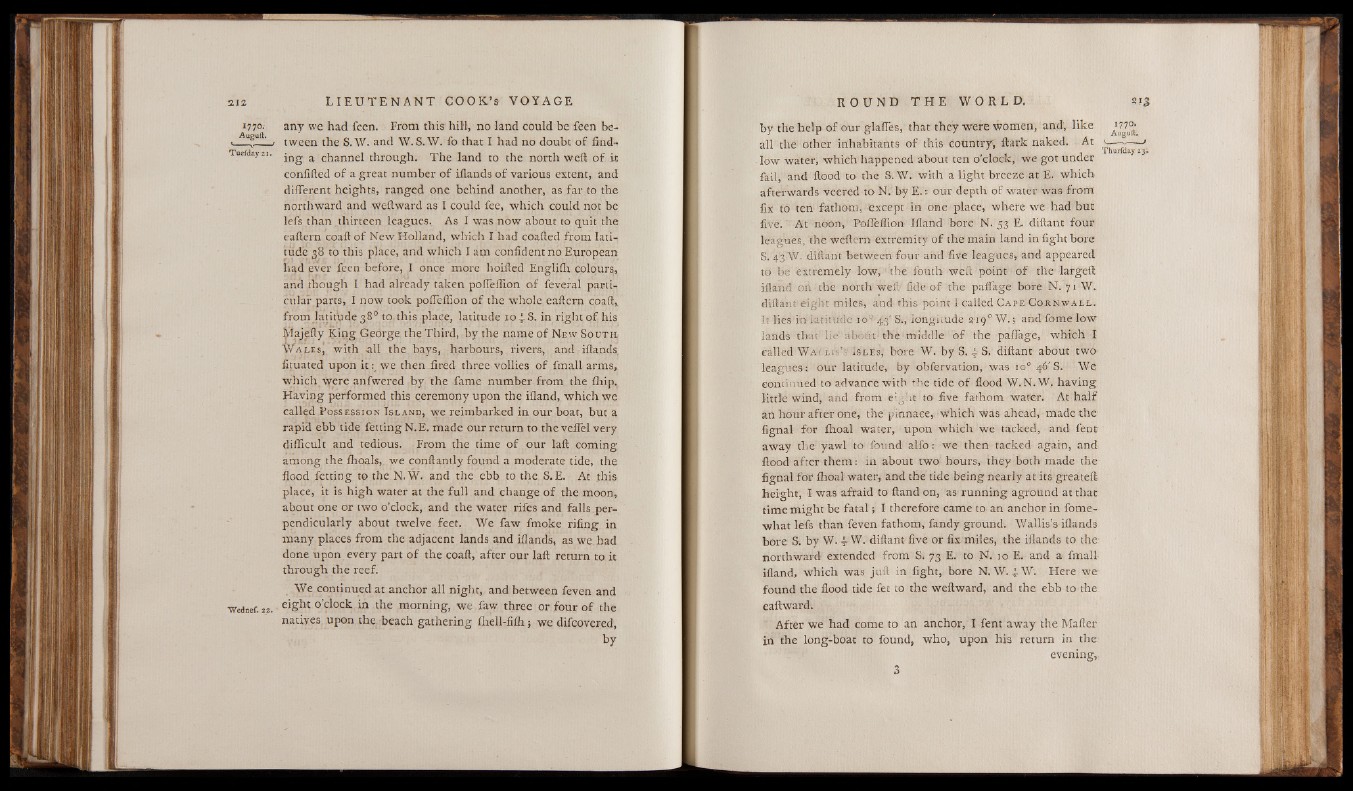
I770;
Auguit.
Tuefday 21,
any we had feen. From this hill, no land could be feen between
the S. W. and W. S. W. fo that I had no doubt of finding
a channel through. The land to the north weft of it
confifted of a great number of iflands of various extent, and
different heights, ranged one behind another, as far to the
northward and weftward as I could fee, which could not be
lefs than thirteen leagues. As I was now about to quit the
eaftern coaft o f New Holland, which I had coafted from latitude
38 to this place, and which I am confident no European
had ever feen before, I once more hoifted Englifh colours,,
and though I had already taken poffeflion of feveral particular
parts, I now took pofleffion of the whole eaftern coaft,
from latitude 38° to. this place, latitude 10 fS . in right o f his
Majefty King George the Third, by the name o f Ne w South.
W a l e s , with all the bays, harbours, rivers, and iflands
fituated upon it:_ we then fired three vollies of fmall arms,
which were anfwered by the fame number from the flaip.
Having performed this ceremony upon the ifland, which we
called P ossession Is l an d , we reimbarked in our boat, but a
rapid ebb tide fettingN.E. made our return to the veflel very
difficult and tedious. From the time of our laft coming
among the fhoals, we conftantly found a moderate tide, the
flood fetting to the N.W. and the ebb to the S.E. At this
place, it Is high water at the full and change of the moon,
about one or two o’clock, and the water rifes and falls perpendicularly
about twelve feet. We faw fmoke riling in
many places from the adjacent lands and iflands, as we had
done upon every part of the coaft, after our laft return to it
through the reef.
We continued at anchor all night, and between feven and
eight o’clock in the morning, we faw three or four of the
natives, upon the. beach gathering fliell-filh; we difcovered,
by
Wednef. 22.
by the help of our glaffes, that they were women, and, like
all the1 other inhabitants of this country, ftark naked. At t ~ — _ Thurlday >,
low waiter, which happened about ten o’clock, we got under
fail, and flood to the S.W. with a light breeze at E. which
afterwards veered to N. by E .: our depth of water was from
fix to ten fathom, except in one place, where we had but
five." At noon, Pofleffion- Ifland bore N. 53 E. diftant four
leagiies, the weftern extremity of the main land in fight bore
S. 43 W. diftant between four and five leagues, and appeared
to be extremely low, the fouth weft point of the largeft
ifland on-.the north weft-'fide of the paffage bore N. 71W.
diftant eight miles, and this point 1 called C a p e C o r n w a l l .
It lies-in latitude 10^-4$ S-., longitude *19° W.; and fome low
lands that lie1 about the middle of the paflage, which I
called W a l l i s ' s Is l e s ; bore W. by S. £ S. diftant about two-
leagues t bur latitude, by obfervation, was 10° 4-6'S. We
continued to advance with the tide of flood W. N. W. having
little wind, and from e’ght to five fathom water. At half
an hour after cme, the pinnace, which was ahead, made the
fignal for fhoal water, upon which we tacked, and fent
away the yawl to found alfo r we then tacked again, and
flood after them: in about two hours, they both made the
fignal foT fhoal water, and the tide being nearly at its greateft
height, I was afraid to ftand on, as running aground at that
time might be fatal; I therefore came to an anchor in fome-
what lefs than feven fathom, fandy ground. Wallis’s iflands
bore S. by W. i f f . diftant five or fix miles, the iflands to the
northward extended from Si 73 E. to N. 10 E. and a fmall
ifland, which was juft in fight, bore N. W.4W. Here we
found the flood tide fet to the weftward, and the ebb to the
eaftward.
After we had come to an anchor, I fent away the Mailer
in the long-boat to found, who, upon his return in the
evening,